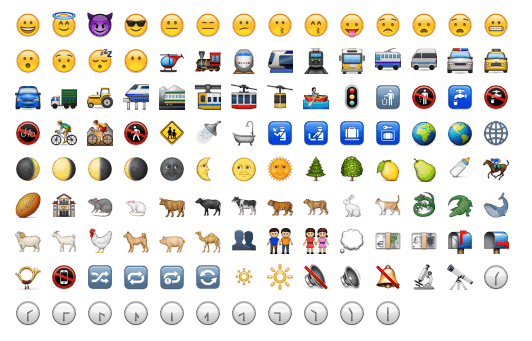
It appears that Twitter started rendering custom Emoji icons on twitter.com about a month ago. I took the opportunity to update my Emoji reference table with their icons and it looks like a full set.
They’re not particularly well drawn, and unfortunately will override native Emoji on operating systems that support them, such as Safari on Mac OS X.
Continue reading…

I’m sure there are more than enough emoticon and Emoji plugins for WordPress, but as I’ve written before rendering Emoji with your own assets comes with copyright problems. Short version: Apple and Microsoft own the copyright to the Emoji artworks in their operating system fonts.
After successfully creating a web font from the Apache-licensed Android Emoji font and spotting the ace Phantom Open Emoji project, I bundled together a WordPress plugin that can display these icon sets to visitors on any system.
Continue reading…

I’ve become oddly obsessed with Emoji recently and in examining the Unicode standardisation of Emoji characters I noticed a surprising number of common characters missing.
When I say “missing” I mean missing from the canonical EmojiSources.txt file in the Unicode standard, but present in iOS.
When I say “common” I mean no more obscure than any of the others and in every day use by iPhone owners.
Splitting the omissions out and viewing them on Android, the glyphs are indeed missing from the system font.
Continue reading…

Emoji characters have been around for a while, but for various reasons I recently took more of an interest in understanding them.
- I just bought my first Android device and noticed that the OS has its own set of icons that I’d previously assumed were limited to iOS – I’d been seeing the world though Apple-shaped eyes.
- I was alerted to a bug in my Latest Tweets plugin where tweets containing Emoji were breaking the WordPress cache. I won’t go into that. It makes me sad.
So I did some homework and had some geeky fun –
Continue reading…
Tim Whitlock's personal site and blog



